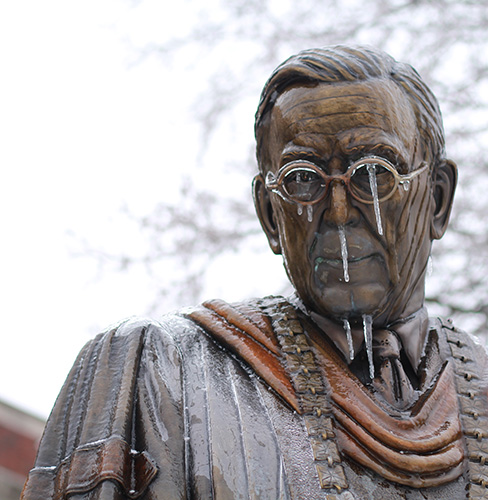
The statue of Rainey T. Wells was covered in ice from last year’s weather, during which the inclement weather policy was created.
In an effort to better educate faculty, staff and students on the University’s inclement weather procedure, President Davies has better defined Murray State’s three-tiered winter weather policy.
In an email sent to all University constituents in December, Davies outlined the three levels of action Murray State may take when inclement weather is pending or present: University Weather Advisory, University Weather Cancellation of Classes or University Campus Closure.
While these actions have always been available to the University, Davies said he wanted everyone, not just administration, to have a common understanding of the terminology being used and what their responsibilities are during these times.
“Lots of people say it’s a change in policy,” he said. “But all I’m really doing is outlining our procedures so people understand what our options are,” he said. “In having a framework and a clear understanding of what that framework means we can adapt specifically to any decision at hand.”
Adapt to decisions, he said, such as whether classes will simply start later after any hazardous weather has cleared, if classes will be canceled but University buildings will stay open or if the entire campus will be closed as it was for three days last January.
Ultimately the decision of what action to take is Davies’.
However, he first receives advisement from Facilities Management and David Burdette, interim Chief Facilities Officer.
“I’ve been on many different campuses and I think (Davies) is doing the right thing by clearly articulating what people’s responsibilities are in three fairly simple terms,” Burdette said.
When deciding on what action to recommend to Davies, Burdette said first he consults both the Murray Police to find out what the road conditions are like.
He also will contact the Facilities Management ground crews to see what the campus’s sidewalks and roadways look like.

Shovels at Wal-Mart were stocked up for the winter season in anticipation of snow, which caused multiple consecutive snow days for Murray State last year.
“The number one issue is safety,” he said. “Whether it’s walking on campus or driving on campus. We do take into account driving to the campus, but two things are always in our head: we are primarily a residential campus with 3,000 students living here and that’s our first responsibility. The second responsibility is getting campus ready for students, faculty and staff if they are arriving.”
After speaking with those under him, Burdette reports to Jackie Dudley, vice president of Finances and Administrative Services, who then passes on the recommendation to Davies.
Dudley said the campus closures last January were not a catalyst for Davies addressing Murray State’s weather policy.
However, she said they did highlight communication issues such as what is expected of staff and faculty on these days.
She said of Davies’ outline that the ‘new tweak’ highlighted was the separation of canceling classes and closing campus during these times of inclement weather.
“If students have a problem with the Bursar’s Office they should be able to call the Bursar’s Office and get help,” she said. “If they want to go to the Wellness Center because they don’t have classes that day they should be able to go to the Wellness Center and work out. (Canceling classes) means we’ll be staffed and things will continue, we just couldn’t be teaching class that day.”
Dudley acknowledged staff and faculty may have reservations about coming to campus on days when classes are canceled.
She said staff and faculty will have the option to use vacation days during these times. If the staff or faculty member in question has no vacation days, they may still choose not to attend their job if they would feel unsafe driving and receive no pay, but suffer no penalty otherwise.
Laura Lohr, president of Staff Congress, said no formal feedback had been reported to her from staff since the plan was introduced to them at their last meeting.
She said she trusts Davies has students’, faculty and staff’s safety in mind.
According to the inclement weather policy, any notifications regarding campus closures or class cancellations will be communicated to the University community via email, the University Facebook and Twitter accounts, the University webpage and WKMS-FM.
Story by Ben Manhanke, Staff writer